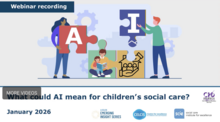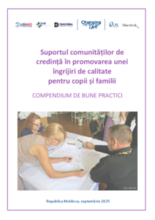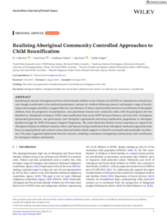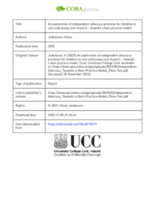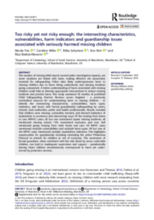Displaying 1 - 10 of 72
To launch a new Emerging Insight Series of webinars from CELCIS, this session set the scene by considering what AI might mean for children’s social care. It explored fundamental questions, potential opportunities, and challenges related to how AI is being used in practice; its role in responding to the care and protection needs of children and young people and supporting their families; and emerging understanding of the influences and impacts of AI on children’s and young people’s lives.
This Chapter in the Book, Participatory Approaches in Child and Family Social Work explores the significance of advocacy in promoting the rights and well-being of children in care.
This booklet of sermons, developed by Diaconia of the Bessarabian Orthodox Church in Moldova promotes solidarity-based communities where children and families thrive in safe and nurturing environments. It provides sermons for priests to emphasize child protection, family values, and community engagement.
The publication summarizes lessons and good practices from the Community Engagement for Better Care pilot project implemented in four communities by Diaconia of the Bessarabian Orthodox Church in Moldova in 2024-2025. The project explored how faith communities - especially the Orthodox Church - can support children and families in need.
This article explores China’s Child Directors System, a nationwide initiative that appoints trained community members to safeguard vulnerable children and connect them with essential services. It highlights the system’s strengths—such as early intervention, broad coverage, and multi-sector collaboration—while noting its potential as a model for other countries.
This article examines why reunification rates for Aboriginal and Torres Strait Islander children in out-of-home care in New South Wales, Australia remain so low, despite being the preferred permanency option. Drawing on insights from practitioners, it highlights the need for culturally grounded approaches and a redefinition of reunification that centers ongoing family and community connections.
This report, from Ireland, provides a comprehensive exploration of the principles and practice of independent advocacy for children and young people with care experience, with a view to signposting what constitutes best practice in this field and proposing a model of advocacy practice which reflects the key themes arising. Resulting from a research project carried out with EPIC (Empowering People in Care), the report draws from the views of those who have experienced advocacy as children and young adults, those who have provided advocacy as professional independent advocates, management personnel responsible for the provision of those services in the context of EPIC and significant stakeholders in the field of advocacy service provision.
Kin and fictive kin involvement can be protective following maltreatment and contribute to the development of children’s strengths. Findings show that support from kin may positively influence strength development for youth in foster care. Professionals in foster care should prioritize kin involvement to enhance support and develop youth strengths.
This study examined 18 months of published Child Safeguarding Practice Reviews across England to identify the intersecting characteristics, vulnerabilities, harm types, indicators and issues with formal guardianship (safeguarding by carers, schools, local authorities, police and health professionals). Results revealed that children were missing, vulnerable, harmed and showed indicators of exploitation in numerous and intersecting ways.
The aim of this study was to examine the academic trajectories of children in out-of-home care (OOCH) and whether kinship care has a protective effect relative to nonkin foster care.

